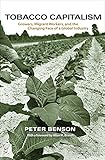Tobacco Capitalism : Growers, Migrant Workers, and the Changing Face of a Global Industry / Peter Benson.
Material type: TextPublisher: Princeton, NJ : Princeton University Press, [2011]Copyright date: ©2012Edition: Course BookDescription: 1 online resource (336 p.) : 19 halftones. 1 line illus. 2 mapsContent type:
TextPublisher: Princeton, NJ : Princeton University Press, [2011]Copyright date: ©2012Edition: Course BookDescription: 1 online resource (336 p.) : 19 halftones. 1 line illus. 2 mapsContent type: - 9780691149202
- 9781400840403
- Antismoking movement -- Social aspects -- North Carolina
- Migrant agricultural laborers -- North Carolina -- Social conditions
- Tobacco farmers -- North Carolina -- Social conditions
- Tobacco industry -- Social aspects -- North Carolina
- Tobacco workers -- North Carolina -- Social conditions
- SOCIAL SCIENCE / Anthropology / General
- 331.7/6337109756 23
- HD8039.T62 U625 2012eb
- online - DeGruyter
- Issued also in print.
| Item type | Current library | Call number | URL | Status | Notes | Barcode | |
|---|---|---|---|---|---|---|---|
 eBook
eBook
|
Biblioteca "Angelicum" Pont. Univ. S.Tommaso d'Aquino Nuvola online | online - DeGruyter (Browse shelf(Opens below)) | Online access | Not for loan (Accesso limitato) | Accesso per gli utenti autorizzati / Access for authorized users | (dgr)9781400840403 |
Browsing Biblioteca "Angelicum" Pont. Univ. S.Tommaso d'Aquino shelves, Shelving location: Nuvola online Close shelf browser (Hides shelf browser)

|

|

|

|

|

|

|
||
| online - DeGruyter The Emancipation of Europe's Muslims : The State's Role in Minority Integration / | online - DeGruyter Depression in Japan : Psychiatric Cures for a Society in Distress / | online - DeGruyter Understanding Autism : Parents, Doctors, and the History of a Disorder / | online - DeGruyter Tobacco Capitalism : Growers, Migrant Workers, and the Changing Face of a Global Industry / | online - DeGruyter The Enculturated Gene : Sickle Cell Health Politics and Biological Difference in West Africa / | online - DeGruyter Post-Soviet Social : Neoliberalism, Social Modernity, Biopolitics / | online - DeGruyter Peasants under Siege : The Collectivization of Romanian Agriculture, 1949-1962 / |
Frontmatter -- Contents -- Illustrations -- Foreword -- Preface -- Introduction -- PART I. THE TOBACCO INDUSTRY, PUBLIC HEALTH, AND AGRARIAN CHANGE -- Chapter 1. Most Admired Company -- Chapter 2. The Jungle -- Chapter 3. Enemies of Tobacco -- PART II. INNOCENCE AND BLAME IN AMERICAN SOCIETY -- Chapter 4. Good, Clean Tobacco -- Chapter 5. El Campo -- Chapter 6. Sorriness -- Conclusion: Reflections on the Tobacco Industry (and American Exceptionalism) -- Bibliography -- Index
restricted access online access with authorization star
http://purl.org/coar/access_right/c_16ec
Tobacco Capitalism tells the story of the people who live and work on U.S. tobacco farms at a time when the global tobacco industry is undergoing profound changes. Against the backdrop of the antitobacco movement, the globalization and industrialization of agriculture, and intense debates over immigration, Peter Benson draws on years of field research to examine the moral and financial struggles of growers, the difficult conditions that affect Mexican migrant workers, and the complex politics of citizenship and economic decline in communities dependent on this most harmful commodity. Benson tracks the development of tobacco farming since the plantation slavery period and the formation of a powerful tobacco industry presence in North Carolina. In recent decades, tobacco companies that sent farms into crisis by aggressively switching to cheaper foreign leaf have coached growers to blame the state, public health, and aggrieved racial minorities for financial hardship and feelings of vilification. Economic globalization has exacerbated social and racial tensions in North Carolina, but the corporations that benefit have rarely been considered a key cause of harm and instability, and have now adopted social-responsibility platforms to elide liability for smoking disease. Parsing the nuances of history, power, and politics in rural America, Benson explores the cultural and ethical ambiguities of tobacco farming and offers concrete recommendations for the tobacco-control movement in the United States and worldwide.
Issued also in print.
Mode of access: Internet via World Wide Web.
In English.
Description based on online resource; title from PDF title page (publisher's Web site, viewed 29. Jul 2021)


